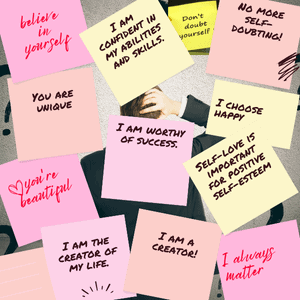Hello, dear listeners. Welcome to another episode of The Lover’s Mindset with your host, Leo Bastien. Today, we will attempt to answer this question What is the root of self-doubt, by exploring its roots and uncovering ways to navigate this challenging aspect of our inner selves.
What Causes Self-Doubt?
The origins of self-doubt are often traced back to the formative years of our lives. Childhood experiences, especially those involving negative criticism or unrealistic expectations, can become imprinted in our subconscious, shaping our beliefs about our capabilities.
Understanding the causes of self-doubt is crucial for our journey of self-discovery. Early experiences, especially during childhood, imprint powerful messages that shape our self-perception. Furthermore, societal expectations and cultural influences contribute to the seeds of self-doubt.
Those societal standards and cultural norms play a major role in causing you to doubt yourself. The constant comparison to societal ideals creates a breeding ground for self-doubt. By examining these complex origins, we gain insight into the complicated web of influences that are shaping our self-perception.
These roots reveal that self-doubt often stems from a combination of internalized messages, external pressures, and societal norms. Being aware of these sources can empower us to dismantle the foundations of self-doubt and rebuild a resilient sense of self.
How Does Imposter Syndrome Contribute to The Root of Self-Doubt?
Imposter syndrome is a psychological phenomenon that brings about a persistent feeling of being a ‘fraud’ despite accomplishments, which creates a belief system that says we have failed and causes more self-doubt. Imposter syndrome makes self-doubting more complicated and confusing. This phenomenon is not just about questioning one’s abilities but feeling like a ‘fraud’, an ‘imposter’ despite our successes.
The fear of being exposed amplifies the constant doubt of what we are capable of. Knowing and understanding what imposter syndrome allows us to be aware of its impact and why it’s causing us to self-doubt. When we recognize the causes of imposter syndrome and its patterns, we can allow ourselves to embrace authenticity. We can start to remove the grip it has on our confidence, fostering a more genuine and self-assured sense of self.
Additionally, imposter syndrome often coexists with perfectionism, creating an unattainable standard. This continual cycle of self-doubting can hinder professional and personal growth. We can disrupt the cycles of imposter syndrome by understanding what it is which allows us to recognize whether we suffer from it or not and will cause us to seek help or take steps to foster a healthier relationship with our achievements.
Can Past Failures Contribute to The Root of Self-Doubt?
Past failures, rather than being viewed solely as setbacks, can become important chapters in our personal growth story. However, the emotional weight attached to these failures can contribute to a lingering sense of doubt and inadequacy. We can choose to see these setbacks as valuable learning experiences that offer a transformative pathway toward self-empowerment.
By digging into the impact of past failures on our present self-perception, we uncover the potential for growth within these experiences. Embracing failure as a natural part of life shifts our mindset, diminishing the fear state and the power of self-doubt and paving the way for resilience.
By reframing our perspective on failure, we unlock the potential for resilience. Understanding that failure is not a reflection of our worth, but a natural part of the learning process empowers us to transform setbacks into steppingstones toward personal and professional success.
How Can Societal Expectations Impact Self-doubt?
Societal expectations act as silent architects shaping our self-perception. The pressure to conform to predefined roles and standards often results in a continual search for external validation, which contributes to doubting ourselves in the absence of societal approval.
Moreover, societal expectations can lead to the acceptance of harmful beliefs, such as comparing our success with external validation like we see on social media. By being aware of these expectations and recognizing their impact, we can embark on a journey toward authenticity, and free ourselves from the constraints of societal norms.
Exploring the link between societal expectations and self-doubt shows the need for cultivating an authentic self among external pressures. When we learn different ways to recognize societal customs and find ways to navigate away from those societal standards, it will empower us to redefine success on our terms, freeing ourselves from the shackles of unrealistic expectations and constant doubt.
Is Comparison The Root of Self-Doubt?
The culture of constant comparison, intensified by social media, deepens our feelings of failure. Each scroll through curated online stories and advertising fuels a negative cycle of self-doubt as we measure our worth against the highlight reels of others.
That pervasive culture of comparison, presented by social media, fuels a toxic environment where self-doubt thrives. Constantly measuring ourselves against others causes a negative cycle of inadequacy.
Understanding the psychology of comparison involves recognizing that these contrasts are often unrealistic and incomplete representations. Many times, those achievements seen online are fake and try to persuade you to buy or sign up for something that will yield no results. By cultivating mindfulness, we can detach from the comparison trap, redirecting our focus inward to foster self-acceptance, self-love, and appreciation for our unique journey.
Undoing the psychology of comparison reveals its profound impact on self-doubt. Remember, by fostering mindfulness and embracing self-acceptance, we can break free from the comparison trap, cultivating a more positive and authentic self-image.
Conclusion
As we conclude this introspective exploration into the roots of self-doubt, remember that the journey toward self-acceptance and self-love is ongoing. Each revelation brings us closer to a more resilient and authentic sense of self.
Self-discovery is a lifelong process, and embracing the complexity of our inner selves allows us to navigate the challenges of self-doubt with compassion. Thank you for joining me on this transformative journey. If you found value in today’s episode, please share it with those who might benefit. Until next time, this is Leo Bastien, signing off from these Inward Insights of The Lover’s Mindset. Namaste.


Leave a Reply